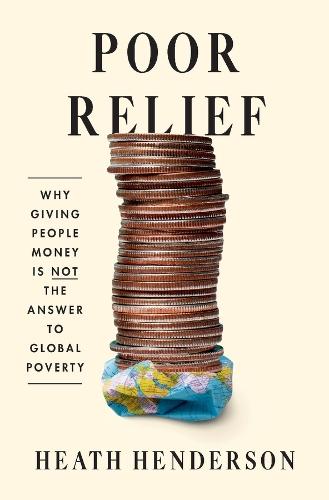Full Product Details
Author: Heath Henderson
Publisher: Harvard University Press
Imprint: Harvard University Press
ISBN: 9780674296138
ISBN 10: 0674296133
Pages: 272
Publication Date: 11 November 2025
Audience:
Professional and scholarly
,
Professional & Vocational
Format: Hardback
Publisher's Status: Forthcoming
Availability: Awaiting stock

Reviews
A stimulating and lucid book, showing that cash transfers have serious limitations and fail to address the structural causes of poverty. Drawing on Amartya Sen's capability approach, Heath Henderson reframes poverty as fundamentally a lack of agency: the capacity to decide for oneself and run one's own life. With engaging examples from both rich and poor countries, he shows how communities can use deliberative democracy to challenge elite capture of health and educational opportunities. Informed by Henderson's arguments, readers will have a way to fight inequality and deprivation without donor paternalism.--David A. Crocker, author of Ethics of Global Development Going against journalistic hype, and full of philosophical patience, this fine book questions the centrality of cash transfers to twenty-first-century social policy. It shows how cash transfers in fact reveal a profound shrinkage of our political imagination, dodging all the important questions about human needs.--Anton Jäger, coauthor of Welfare for Markets In Poor Relief, Heath Henderson argues that cash transfers shouldn't be mere handouts from the rich. Instead, he advocates for involving local communities directly in designing these programs. By focusing on boosting capabilities rather than just incomes, he presents a persuasive and passionate case for a more empowering and dignified approach to poverty alleviation.--Yuen Yuen Ang, author of How China Escaped the Poverty Trap Poor Relief combines case studies in Tanzania, Ghana, Uganda, and beyond with the theory of deliberative democracy. I recommend this book for its very thoughtful and detailed account of how deliberative democracy can guide poverty alleviation.--James S. Fishkin, author of Democracy When the People Are Thinking: Revitalizing Our Politics Through Public Deliberation It was the best of schemes, it was the worst of schemes--there are cash transfers of both types, and more in between. The devil is in details that may be hard to fathom in advance. Drawing on a wealth of experience worldwide, Heath Henderson's Poor Relief raises sharp questions about this deceptively simple approach to poverty reduction, and presents some insightful answers too.--Jean Drèze, coauthor of An Uncertain Glory: India and Its Contradictions
A cogent critique of a trendy philanthropic tool.-- ""Publishers Weekly"" (9/5/2025 12:00:00 AM) A stimulating and lucid book, showing that cash transfers have serious limitations and fail to address the structural causes of poverty. Drawing on Amartya Sen's capability approach, Heath Henderson reframes poverty as fundamentally a lack of agency: the capacity to decide for oneself and run one's own life. With engaging examples from both rich and poor countries, he shows how communities can use deliberative democracy to challenge elite capture of health and educational opportunities. Informed by Henderson's arguments, readers will have a way to fight inequality and deprivation without donor paternalism.--David A. Crocker, author of Ethics of Global Development Going against journalistic hype, and full of philosophical patience, this fine book questions the centrality of cash transfers to twenty-first-century social policy. It shows how cash transfers in fact reveal a profound shrinkage of our political imagination, dodging all the important questions about human needs.--Anton Jäger, coauthor of Welfare for Markets In Poor Relief, Heath Henderson argues that cash transfers shouldn't be mere handouts from the rich. Instead, he advocates for involving local communities directly in designing these programs. By focusing on boosting capabilities rather than just incomes, he presents a persuasive and passionate case for a more empowering and dignified approach to poverty alleviation.--Yuen Yuen Ang, author of How China Escaped the Poverty Trap Poor Relief combines case studies in Tanzania, Ghana, Uganda, and beyond with the theory of deliberative democracy. I recommend this book for its very thoughtful and detailed account of how deliberative democracy can guide poverty alleviation.--James S. Fishkin, author of Democracy When the People Are Thinking: Revitalizing Our Politics Through Public Deliberation It was the best of schemes, it was the worst of schemes--there are cash transfers of both types, and more in between. The devil is in details that may be hard to fathom in advance. Drawing on a wealth of experience worldwide, Heath Henderson's Poor Relief raises sharp questions about this deceptively simple approach to poverty reduction, and presents some insightful answers too.--Jean Drèze, coauthor of An Uncertain Glory: India and Its Contradictions
Poor Relief combines case studies in Tanzania, Ghana, Uganda, and beyond with the theory of deliberative democracy. I recommend this book for its very thoughtful and detailed account of how deliberative democracy can guide poverty alleviation.--James S. Fishkin, author of Democracy When the People Are Thinking: Revitalizing Our Politics Through Public Deliberation It was the best of schemes, it was the worst of schemes--there are cash transfers of both types, and more in between. The devil is in details that may be hard to fathom in advance. Drawing on a wealth of experience worldwide, Heath Henderson's Poor Relief raises sharp questions about this deceptively simple approach to poverty reduction, and presents some insightful answers too.--Jean Drèze, coauthor of An Uncertain Glory: India and Its Contradictions
Author Information
Heath Henderson is Associate Professor of Economics at Drake University. He has worked with the World Bank, the Inter-American Development Bank, and the United Nations.



